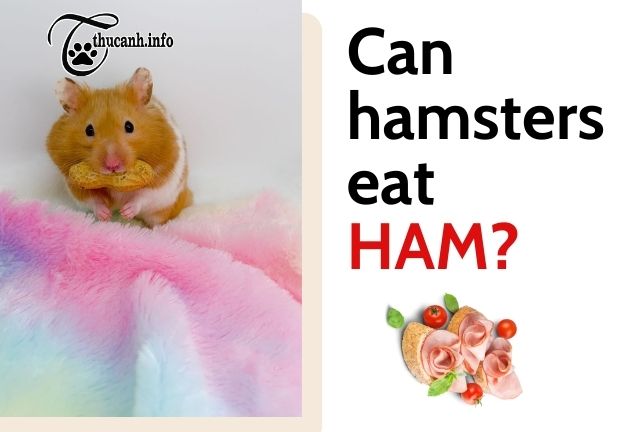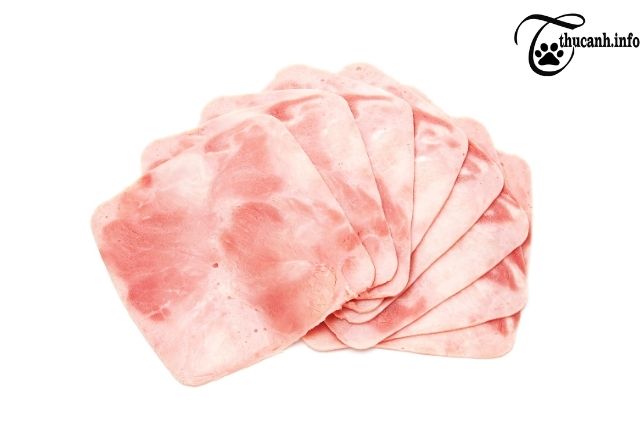Hamsters: Can they eat ham? As a pet owner, it’s important to know what your pet can and can’t eat. For example, hamsters are cute little animals that need a well-balanced food to be healthy and happy.
Can hamsters eat ham, though? Many pet owners wonder the same thing, but the answer isn’t as simple as you might think. We’ll talk about everything you need to know about giving hamsters ham in this piece.

Can hamsters eat ham?
1, Do hamsters like to eat ham?
Animal experts who have done the most study say that hamsters can eat ham, but it’s not a good idea. Ham is processed, has a lot of fat, and is salty and high in sodium, which can be bad for hamsters’ health. It is best to give them cooked chicken or boiled eggs, which are good sources of energy. For your hamster’s health, you should always put a balanced food first.
2, What hamsters need to eat to stay healthy
Hamsters, like all other living things, need certain nutrients to grow and stay healthy. Understanding their food needs is important if you want to give them a balanced and healthy diet. When it comes to feeding hamsters, there are a few important things to keep in mind:
- Protein: Hamsters need a good amount of protein in their food to grow, develop, and keep their bodies working well. Protein is needed to keep muscles in good shape, fix damaged tissues, and make enzymes and hormones.
- Carbohydrates: Carbohydrates are the main way that hamsters get energy. Complex carbohydrates from grains and vegetables are better than simple sugars because they keep your energy level steady and keep your blood sugar from going up and down.
- Fibre: Fibre is a very important part of hamster eating and helps keep their digestive tracts healthy. It helps keep food moving through the digestive system and keeps you from getting constipated.
- Vitamins and minerals: For their overall health, hamsters need a range of vitamins and minerals. These include vitamins A, D, E, and C, as well as calcium, iron, and other minerals. These nutrients help your body build strong bones and teeth, a strong immune system, and organs that work well.
- Hydration: Hamsters need access to clean, fresh water to stay refreshed and keep their bodies working well. It is best to give hamsters a bottle of water or a small dish of water that is always full of fresh water.
No, hamsters shouldn’t eat ham. That’s the short answer. Even though ham is high in fat, it is a good source of energy. However, hamsters should not eat it. To stay healthy, hamsters need to eat a low-fat diet, since too much fat can cause obesity and other health problems. Also, ham has a lot of salt, which can be very bad for a hamster’s health.
When thinking about whether or not hamsters can safely eat ham, it’s important to know the possible risks and things to think about. Ham is a popular food for people, but it shouldn’t be part of a hamster’s diet for the following reasons:
Ham usually has a lot of salt, which is bad for a hamster’s health. Their small bodies aren’t made to handle a lot of salt, and eating gammon with a lot of sodium can make them thirsty and cause other health problems.
2, Processed Meat: Most gammon sold in stores has been processed and has added ingredients, stabilisers and spices. The gut system and health of a hamster can be hurt by these additives and preservatives. Hamsters’ digestive systems are very sensitive, so they need to eat mostly natural, unprocessed things.
Ham is known for having a lot of fat and salt. When hamsters eat too many fatty foods, they can gain weight and become overweight, which can be bad for their health as a whole. Also, the high amount of salt can cause elevated blood pressure and other health problems.

Hamsters and ham
3, Other Ways Hamsters Can Get Protein
Instead of ham, a hamster can eat a variety of safe and healthy protein sources other than ham. These options give you the nutrients you need without the dangers:
- Lean animal protein: Hamsters can easily eat cooked chicken, hard-boiled eggs, or small amounts of cooked meat that hasn’t been seasoned. These protein sources give you the amino acids you need to build muscle and grow as a whole.
- Insects and Mealworms: Insects and mealworms are natural sources of nutrition that are similar to what wild hamsters eat. They are full of good things for hamsters to eat and can be given to them as treats or to add to their normal food.
- Plant-Based Proteins: Hamsters can also get protein from foods like tofu, lentils, and cooked beans, which come from plants. These choices are a healthy replacement to proteins from animals and can help you eat a balanced diet.
It’s important to remember that hamsters should only get a small amount of protein as part of a well-balanced meal. Talk to a doctor or other knowledgeable person to figure out how much and what kind of protein your hamster needs based on their individual needs and dietary requirements.
By focusing on safe and good sources of protein, hamster owners can make sure their pets get all the nutrients they need without hurting their health. For hamsters to live long and healthy lives, they need to eat a variety of foods in the right amounts.
4, Giving hamsters the right kinds of protein sources
4.1, Hamsters Can Eat Safe Protein
When it comes to giving hamsters protein sources that meet their nutritional needs, it’s important to think of alternatives to ham. Here are some healthy and safe choices:
Cooked chicken: Hamsters can eat lean, boneless, and skinless chicken as a source of energy. It needs to be cooked all the way through without any spices or extra ingredients. Cut the chicken into small pieces that are easy for your hamster to eat.
Eggs that have been boiled are another source of protein that can be given to a hamster. Before serving, make sure the eggs are fully cooked and have cooled down. Take off the egg’s shell and cut it into small pieces that your hamster can eat.
Mealworms: Dried mealworms are a great treat for hamsters because they are high in protein. They can be bought at pet stores, and hamsters in the wild eat them on their own. Make sure the mealworms are made just for hamsters and don’t have any extra ingredients or chemicals.
4.2, Hamsters Need a Healthy Diet
Even though protein is an important part of a hamster’s diet, it’s also important to give it a balanced and varied meal with other nutrients. Hamsters need a mix of protein, carbs, fibre, vitamins, and minerals to grow and stay healthy. Here are some important things to think about for a hamster’s diet:
- Fresh Vegetables: Serve a range of fresh, washed vegetables to get vitamins, minerals, and fibre that your body needs. Carrots, broccoli, spinach, and bell peppers are all good choices. Slowly give your hamster new foods and watch how it reacts.
- Hamster Pellets of Good Quality: Hamster pellets that are sold in stores have a proper mix of nutrients that are made to meet a hamster’s needs. Look for pellets that are made especially for hamsters and don’t have any added colours, flavours, or fillers.
- Only So Many Fruit Treats: Fruits can be tasty treats for hamsters, but because they are high in sugar, they shouldn’t be given too much. Small pieces of apple, pear, or nuts are all good choices. Before giving them to your hamster, take out any seeds or pits.
- Fresh Water: Make sure your hamster always has clean, fresh water to drink. Use a bottle with a sipper or a small bowl that makes it easy for them to drink. Every day, change the water to keep it clean.

What food do hamsters eat?
5, Trying to get hamsters to eat a healthy diet
5.1, Why a Well-Rounded Diet Is Important
Hamsters need to eat a well-balanced food to stay healthy and happy as a whole. A well-balanced diet makes sure that they get all of the nutrients, vitamins, and minerals they need to grow, stay healthy, and do their other bodily processes. Here are some of the most important reasons why hamsters need a healthy diet:
- Food Needs: Hamsters have certain food needs that must be met for their health to be at its best. A balanced meal gives them the right amount of proteins, carbs, fats, vitamins, and minerals they need to grow and develop.
- Energy and vitality: Hamsters get the energy they need from a well-balanced food to stay active, playful, and alert. It helps them keep a healthy weight and stops problems like being overweight or not getting enough food.
- Digestive Health: Eating a lot of fresh veggies and grains that are high in fibre helps with digestion and keeps problems like constipation and diarrhoea from happening. It helps keep the gut healthy and makes sure that nutrients are absorbed well.
- Dental health: Having a balanced diet with a range of foods to chew on helps wear down their teeth as they grow. This stops oral problems like overgrown teeth or misaligned teeth, which can hurt and make it hard to eat.
5.2: Talking to a Veterinarian
Before giving your hamster any new foods, you should talk to a doctor who specialises in caring for small animals. A vet can give you expert help and guidance that is just right for your hamster. They will look at your hamster’s age, health, and individual needs to make sure that the food they suggest is safe and right.
A vet can also tell you important things about how much to feed your pet, how often, and if there are any risks or problems that come with certain foods. By talking to a professional, you can make smart choices about what to feed your hamster and give it the best care possible.
Remember that every hamster is different and may have different food needs. Taking your hamster to the vet for regular checkups and talking to them about what they need will help you make sure they get a balanced meal that meets their nutritional needs.
Are hamsters able to eat ham? THUCANH says that gammon is not a good food for hamsters because it has a lot of salt, fat, and processing. Instead, it is important to give hamsters a balanced meal that gives them all the nutrients they need. Choose protein sources that are safe and healthy, like cooked chicken, hard-boiled eggs, or dried mealworms.
Always put your hamster’s health first and talk to a vet for personalised advice on what to feed it. By giving your furry friend a balanced meal, you can make sure they stay happy and healthy.


